
- Retrait gratuit dans votre magasin Club
- 7.000.000 titres dans notre catalogue
- Payer en toute sécurité
- Toujours un magasin près de chez vous
- Retrait gratuit dans votre magasin Club
- 7.000.0000 titres dans notre catalogue
- Payer en toute sécurité
- Toujours un magasin près de chez vous
Five Steps of Outcome-Based Planning and Evaluation for Public Libraries
Melissa Gross, Cindy Mediavilla, Virginia a Walter
Livre broché | Anglais
62,95 €
+ 125 points
Description
Planning and assessment are both crucial elements of a public library that functions efficiently and flexibly. So why are they often treated as separate processes? This concise book combines planning and evaluation in a holistic approach, helping public library managers and staff put library resources to work for the community. Based on a series of successful workshops, the authors present a workflow made up of manageable steps for integrating outcome-based planning and evaluation (OBPE) into the routine functions of the public library. Offering step by step guidance that's transparent and easy to follow, this book introduces the concept of OBPE and explains how it can be a streamlined, effective method of getting library users' feedback; defines "outcomes" and shows why public libraries should use them to plan and evaluate services; shares methodologies for assessing community needs and interests, including key informant interviews, surveys, focus groups, and environmental scans; demonstrates how to use community assessment data to create outcome statements that not only guide the creation of new library services, but also provide targets for measuring the effectiveness of those services; offers techniques for designing services that directly serve the community while also achieving the outcomes the library has targeted; and provides tips for sharing the results with stakeholders and maximizing successful outcome-based programs to leverage the library's role in the community. Featuring plentiful examples of how to proceed through each phase of the OBPE model, this book boils down planning and evaluation into an approachable, easy to understand process for public librarians, library managers, and grant writers.
Spécifications
Parties prenantes
- Auteur(s) :
- Editeur:
Contenu
- Nombre de pages :
- 120
- Langue:
- Anglais
Caractéristiques
- EAN:
- 9780838914045
- Date de parution :
- 13-01-16
- Format:
- Livre broché
- Format numérique:
- Trade paperback (VS)
- Dimensions :
- 152 mm x 229 mm
- Poids :
- 172 g

Les avis
Nous publions uniquement les avis qui respectent les conditions requises. Consultez nos conditions pour les avis.






